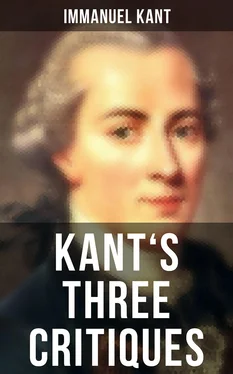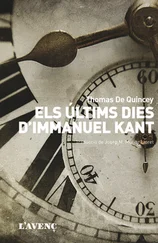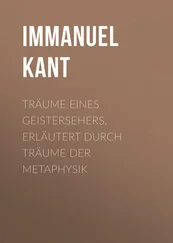When therefore we say, the senses represent objects as they appear, the understanding as they are, the latter statement must not be understood in a transcendental, but only in an empirical signification, that is, as they must be represented in the complete connection of phenomena, and not according to what they may be, apart from their relation to possible experience, consequently not as objects of the pure understanding. For this must ever remain unknown to us. Nay, it is also quite unknown to us whether any such transcendental or extraordinary cognition is possible under any circumstances, at least, whether it is possible by means of our categories. Understanding and sensibility, with us, can determine objects only in conjunction. If we separate them, we have intuitions without conceptions, or conceptions without intuitions; in both cases, representations, which we cannot apply to any determinate object.
If, after all our inquiries and explanations, any one still hesitates to abandon the mere transcendental use of the categories, let him attempt to construct with them a synthetical proposition. It would, of course, be unnecessary for this purpose to construct an analytical proposition, for that does not extend the sphere of the understanding, but, being concerned only about what is cogitated in the conception itself, it leaves it quite undecided whether the conception has any relation to objects, or merely indicates the unity of thought — complete abstraction being made of the modi in which an object may be given: in such a proposition, it is sufficient for the understanding to know what lies in the conception — to what it applies is to it indifferent. The attempt must therefore be made with a synthetical and so-called transcendental principle, for example: “Everything that exists, exists as substance,” or, “Everything that is contingent exists as an effect of some other thing, viz., of its cause.” Now I ask, whence can the understanding draw these synthetical propositions, when the conceptions contained therein do not relate to possible experience but to things in themselves (noumena)? Where is to be found the third term, which is always requisite PURE site in a synthetical proposition, which may connect in the same proposition conceptions which have no logical (analytical) connection with each other? The proposition never will be demonstrated, nay, more, the possibility of any such pure assertion never can be shown, without making reference to the empirical use of the understanding, and thus, ipso facto, completely renouncing pure and non-sensuous judgement. Thus the conception of pure and merely intelligible objects is completely void of all principles of its application, because we cannot imagine any mode in which they might be given, and the problematical thought which leaves a place open for them serves only, like a void space, to limit the use of empirical principles, without containing at the same time any other object of cognition beyond their sphere.
37 In one word, to none of these conceptions belongs a corresponding object, and consequently their real possibility cannot be demonstrated, if we take away sensuous intuition — the only intuition which we possess — and there then remains nothing but the logical possibility, that is, the fact that the conception or thought is possible — which, however, is not the question; what we want to know being, whether it relates to an object and thus possesses any meaning.
Table of Contents
Of the Equivocal Nature or Amphiboly of the Conceptions of Reflection from the Confusion of the Transcendental with the Empirical use of the Understanding.
Reflection (reflexio) is not occupied about objects themselves, for the purpose of directly obtaining conceptions of them, but is that state of the mind in which we set ourselves to discover the subjective conditions under which we obtain conceptions. It is the consciousness of the relation of given representations to the different sources or faculties of cognition, by which alone their relation to each other can be rightly determined. The first question which occurs in considering our representations is to what faculty of cognition do they belong? To the understanding or to the senses? Many judgements are admitted to be true from mere habit or inclination; but, because reflection neither precedes nor follows, it is held to be a judgement that has its origin in the understanding. All judgements do not require examination, that is, investigation into the grounds of their truth. For, when they are immediately certain (for example: “Between two points there can be only one straight line”), no better or less mediate test of their truth can be found than that which they themselves contain and express. But all judgements, nay, all comparisons require reflection, that is, a distinction of the faculty of cognition to which the given conceptions belong. The act whereby I compare my representations with the faculty of cognition which originates them, and whereby I distinguish whether they are compared with each other as belonging to the pure understanding or to sensuous intuition, I term transcendental reflection. Now, the relations in which conceptions can stand to each other are those of identity and difference, agreement and opposition, of the internal and external, finally, of the determinable and the determining (matter and form). The proper determination of these relations rests on the question, to what faculty of cognition they subjectively belong, whether to sensibility or understanding? For, on the manner in which we solve this question depends the manner in which we must cogitate these relations.
Before constructing any objective judgement, we compare the conceptions that are to be placed in the judgement, and observe whether there exists identity (of many representations in one conception), if a general judgement is to be constructed, or difference, if a particular; whether there is agreement when affirmative; and opposition when negative judgements are to be constructed, and so on. For this reason we ought to call these conceptions, conceptions of comparison (conceptus comparationis). But as, when the question is not as to the logical form, but as to the content of conceptions, that is to say, whether the things themselves are identical or different, in agreement or opposition, and so on, the things can have a twofold relation to our faculty of cognition, to wit, a relation either to sensibility or to the understanding, and as on this relation depends their relation to each other, transcendental reflection, that is, the relation of given representations to one or the other faculty of cognition, can alone determine this latter relation. Thus we shall not be able to discover whether the things are identical or different, in agreement or opposition, etc., from the mere conception of the things by means of comparison (comparatio), but only by distinguishing the mode of cognition to which they belong, in other words, by means of transcendental reflection. We may, therefore, with justice say, that logical reflection is mere comparison, for in it no account is taken of the faculty of cognition to which the given conceptions belong, and they are consequently, as far as regards their origin, to be treated as homogeneous; while transcendental reflection (which applies to the objects themselves) contains the ground of the possibility of objective comparison of representations with each other, and is therefore very different from the former, because the faculties of cognition to which they belong are not even the same. Transcendental reflection is a duty which no one can neglect who wishes to establish an a priori judgement upon things. We shall now proceed to fulfil this duty, and thereby throw not a little light on the question as to the determination of the proper business of the understanding.
Читать дальше












